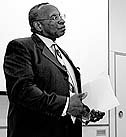Crime is still the prevailing concern at neighborhood meetings around the city. With the most recent crime statistics showing increases over last year in both property and violent crime, community members are looking for other ways to deal with the problem beyond calling the police.
"Protecting the neighborhood can't just be about calling the police and waiting for them to arrive," said Battlefield Community Association President Daisy Mildred Davis. "It's about getting the neighborhoods to come together and look out for one another. It's about being there to watch your neighbor's back."
About 25 people attended the most recent Battlefield Community Association meeting, at least 10 more than is typical.
Representatives from local businesses like Puckett Machinery on Highway 80 and Mississippi Valley Gas also attended.
Glenn Keys, from Mississippi Valley Gas, complained that metal recyclers in his area make stealing metal easier by providing a market. "They can take metal and sell it without having to show any type of I.D. or anything," Keys said.
Residents cited many examples of crime in the neighborhood, from drugs sold within view of a church to prostitution conducted at businesses in open view of the management.
"We've got prostitutes and drug dealers walking up and down our street, cutting into back of the truck stop next to us," said Sefco employee Chris Lamb. "Also, the crack houses on Galilee Street have been there almost 20 years. If there's one thing that is not getting handled, it's those. There are people in those neighborhoods who are terrified, but nothing gets done about them."
Davis said prostitution is still a problem in her area, though JPD has been cracking down on the misdemeanor crime over the last few weeks, during which JPD has made 23 arrests on solicitation charges, busting men seeking negotiable affection from Jackson's less discriminating ladies. Misdemeanor cases such as solicitation are often turned away from the county jail, but Hinds County Sheriff Malcolm McMillin says the busts are, nevertheless, an effective deterrent.
The seemingly ubiquitous presence of homeless people in Jackson is also an issue, though the problem appears more pervasive in the Battlefield Park area.
"They may be coming out of the state hospital or some place like that," Davis said. "When they finish their treatment, and they have no more room for them, they've gotta go. When they go, if they don't have a correspondent, they'll take them to some homeless shelters in this area, and this territory becomes a stomping ground for them."
Manpower is a problem all over, said Sgt. Perry Martin at a Dec. 7 Quality of Life Seminar at the police training academy on Jayne Avenue.
"Let me explain it like this: If I set my wallet on the table here and walk off, there's nothing to stop anyone in here from taking it. Now if I set my wallet on the table there and stand over here with my gun like this and dare someone to take it, will they take it? Of course not. Well, that's like having more police. We need more people watching things."
The police department is about 150 officers shy of the 600 head-count recommended by the 1999 Linder-Maple Study, and about 50 officers shy of the 500-cop force at the time of Melton's arrival in July 2005.
Carol Nash, who attended the Quality of Life seminar, said she will help by working closely with police over the next few weeks. Nash, 56, is a retiree living across the street from police training academy on Jayne Avenue. She said she is terrorized by youth in the area casing her house and causing problems.
Sen. White said at the Battlefield meeting that the city of Jackson and Hinds County need to emulate crime-fighting tactics in other areas. "Clinton won't let drug dealers set in over there. ... Sometimes when a crime is committed, the first thing they want to know is where the crime was committed. Was it in Madison, Rankin or Hinds County? You know what that means to me? That means that somebody over in Hinds County ain't doing their jobs right," White said.
Hinds County DA Faye Peterson said later that she hoped White would do his part to help solve the problem: "Certainly we expect that he will be at the forefront in this legislative session and all others, making sure that all aspects of the criminal justice system are fully funded and adequately staffed to address all citizens' needs in the community."
Rep. John Reeves, R-Jackson, said at the Battlefield meeting that he is already working to submit a bill that will allow the state to make up for the untaxed property filling the city. About 40 percent of city property is tax-exempt because either churches or non-profits own it or it houses government facilities—forcing the city to take a huge hit. Reeves is devising a payment in lieu of tax (PILT) bill to allow the state to fill in some of those holes.
"People commuting to the city and bringing their lunch don't benefit the city, even though they're still using its resources, like its streets and infrastructure," Reeves said. "I think (legislators) are coming to realize that the city is hurting."



Comments
Use the comment form below to begin a discussion about this content.